
President-elect Donald Trump suggested Tuesday he would consider using military force to gain control of the Panama Canal and Greenland, and “economic force” to acquire Canada.
During a free-wheeling news conference at his Mar-a-Lago resort in Florida, Trump was asked by a reporter if he could assure the public that he would not use military coercion against Panama or Greenland, a goal he has floated in recent weeks. “No, I can’t assure you on either of those two, but I can say this, we need them for economic security,” Trump said. He said later that he would not use military force against Canada, only “economic force.”3
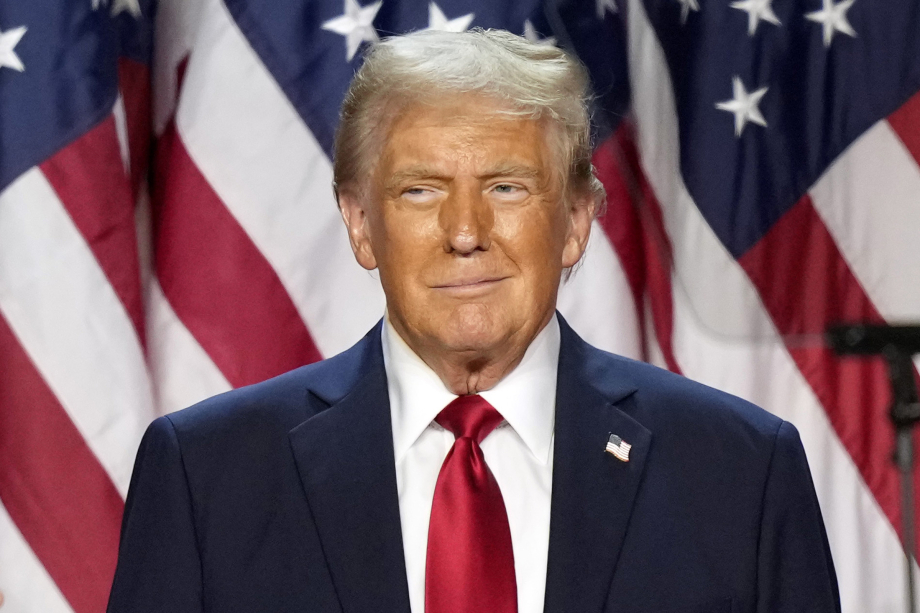
“That would really be something,” Trump said of the United States’ taking control of Canada.
“You get rid of that artificially drawn line, and you take a look at what that looks like. And it would also be much better for national security,” Trump said. “They’re great, but we’re spending hundreds of billions here to protect it.” Trump said that the subsidies include substantial military support and that the United States loses out through trade deficits.
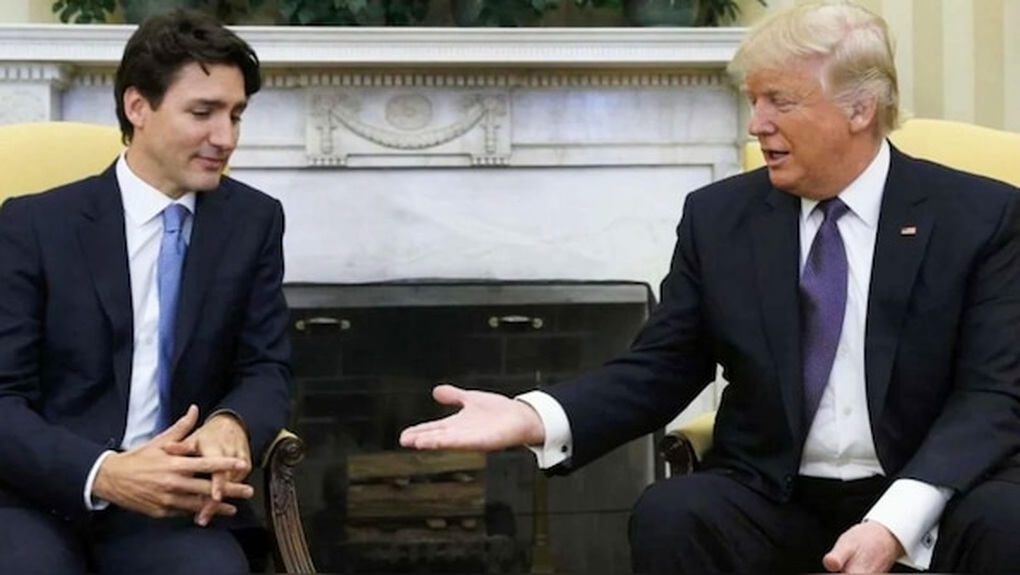
It’s not immediately clear which funds Trump was referring to, but he has frequently complained about Canada and other NATO allies’ not paying enough for defense spending. The United States and Canada also have a shared military alliance through North American Aerospace Defense Command.
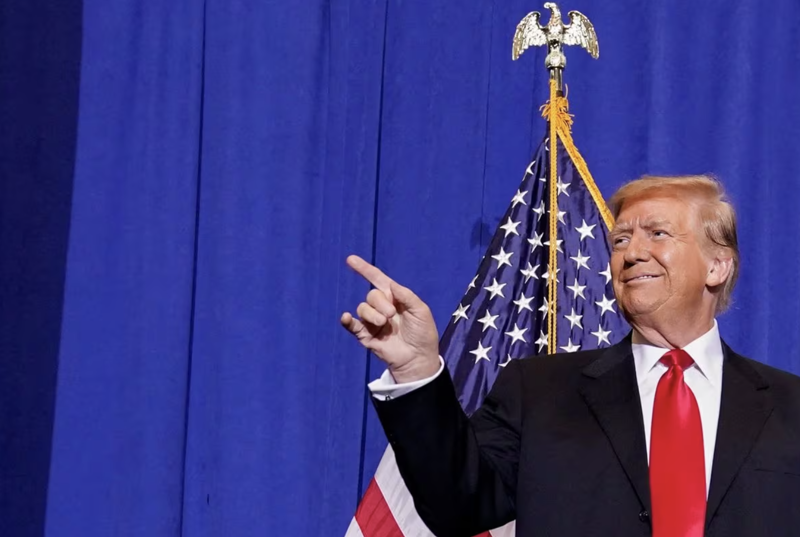
Trump on Tuesday night posted an image on Truth Social of the two countries with the U.S. flag emblazoned across them, writing, “Oh Canada!”
He has quipped lately that it should become the 51st state and said Tuesday that he had joked with hockey legend Wayne Gretzky, a Canadian, about becoming “governor.” Canadian Prime Minister Justin Trudeau’s 10-year term came to an abrupt end Monday in part because of party infighting over his handling of Trump and the promise of 25% tariffs that Trump has promised to enact.

Since winning the 2024 presidential election, Trump has touted a strategic interest for the United States in purchasing Greenland, an Arctic island that is part of Danish territory, reiterating his desire to acquire it last month. It’s not a new idea for Trump: A gambit to purchase Greenland was mocked when it came up during his first term in office. His eldest son, Donald Trump Jr., was on the ground Tuesday filming for a documentary accompanied by at least two incoming White House officials.
“Well, we need greater national security purposes. I’ve been told that for a long time, long before I even ran,” Trump told reporters. “You have approximately 45,000 people there. People really don’t even know that Denmark has any legal right to it, but if they do, they should give it up because we need it for national security.” He threatened to levy tariffs on Denmark at “a very high level” if it thwarted efforts by the Arctic island to seek independence or to join the United States.
In a video posted to social media earlier in the day, Trump called into a lunch event on the island with Trump Jr.
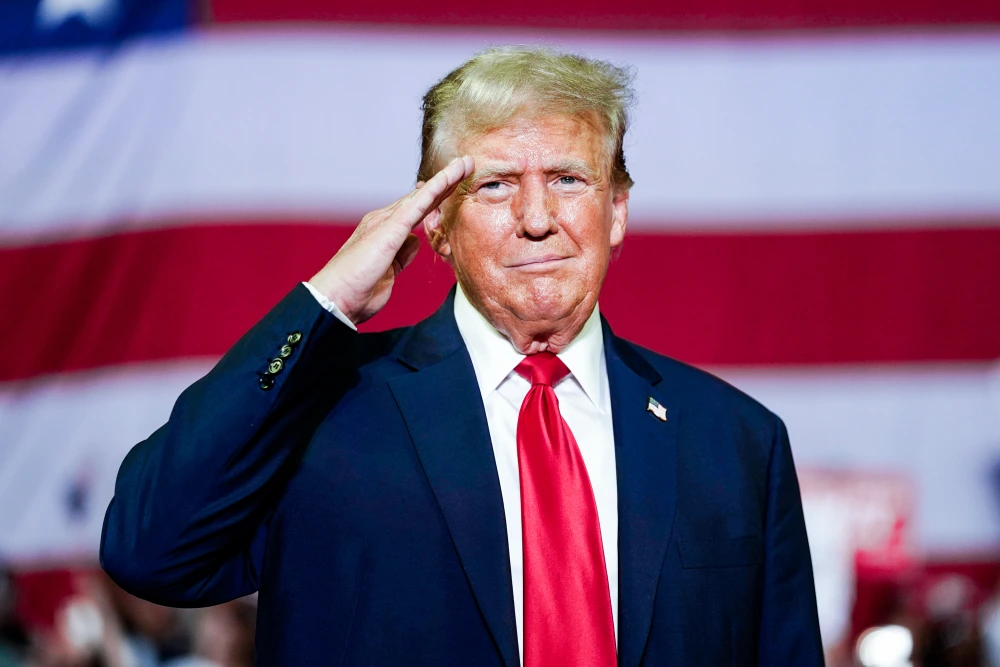
Of Panama, Trump claimed that the United States is treated unfairly when it is “overcharged” higher rates for its ships to sail the canal than those of other countries, and that Panama is in “violation” of a deal with the United States. Trump claimed Panama has requested $3 billion from the United States help repair the canal, which slashes transport time between the Atlantic and Pacific oceans, even as “China is basically taking it over.” He has threatened to try to take it back and said returning it to U.S. control is “vital” to national security.
While it is not clear what deal Trump was referring to, under the terms of a Carter administration treaty that transitioned control of the canal from the United States to Panama by 1999, the United States would hold the right to defend the canal from any change to its neutrality.

“We gave the Panama Canal to Panama. We didn’t give it to China,” Trump said. “They’ve abused that gift.”
The canal is administered by the Panama Canal Authority, although a Hong Kong-based contractor operates two ports connected to it.
Panamanian President José Raúl Mulino denied in a video statement last month that China has influence over the canal and shot down the idea of the United States’ taking back authority over it. “Every square meter of the canal belongs to Panama and will continue to be so,” he said.
He also took aim at Mexico during his remarks and said he would seek to rename Gulf of Mexico to “the Gulf of America, which has a beautiful ring.”
“What a beautiful name, and it’s appropriate,” said before he criticized Mexico for not doing enough to curb migration. “Mexico has to stop allowing millions of people to pour into our country. They can stop them, and we’re going to put very serious tariffs on Mexico and Canada, because Canada, they come through Canada, too.”
Trump has offered few details on how he might carry out his plans to grow the U.S. footprint, even as he promised throughout the press conference to return the United States to a “golden age” of improved national security and “common sense.”
“This will be the golden age of America,” Trump said.
Trump threatens ‘economic force’ to make Canada 51st state

It no longer sounds like a joke
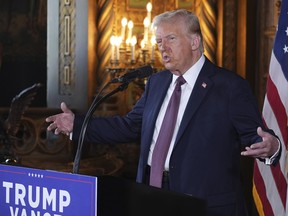
U.S. president-elect Donald Trump escalated his remarks about making Canada part of the U.S. during a press conference at his Mar-a-Lago resort in Florida on Tuesday. And he reiterated that he intends to put “substantial” tariffs on goods from Canada and Mexico.
Asked if he would use military force to annex Canada, he replied “no — economic force. Because Canada and the United States, that would really be something. You get rid of that artificially-drawn line and you take a look at what that looks like, and it would also be much better for national security — don’t forget, we basically protect Canada.”
:max_bytes(150000):strip_icc():focal(511x0:513x2)/GettyImages-969783414-5b1fb4433128340036baecdc.jpg)
Trump claimed the U.S. is subsidizing Canada to the tune of US$200 billion a year, an apparent reference to the U.S. trade deficit and possible other factors.
The total U.S. trade deficit in goods and services with Canada was US$40.6 billion in 2023, according to U.S. Census Bureau data. It’s driven by energy exports: the U.S. buys more than four million barrels a day of Canadian crude oil during some months.
Trump’s latest provocation prompted Prime Minister Justin Trudeau to respond on X: “There isn’t a snowball’s chance in hell that Canada would become part of the United States.” More than 80 per cent of Canadians are opposed to the idea, according to a recent poll.
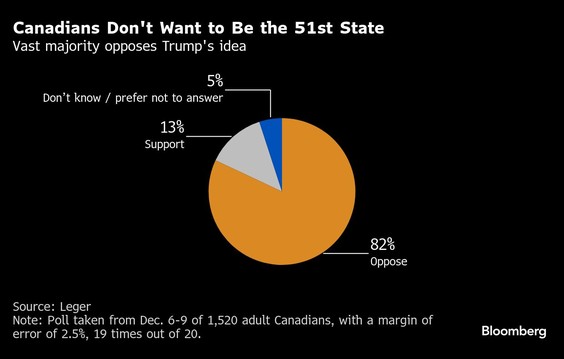
Members of Trudeau’s government had previously played off the 51st state remarks as a joke.
Trump said the U.S. doesn’t need “anything” that Canada produces.
He said he’d rather make cars in Detroit instead of relying on the highly-integrated continental auto supply chain, and not buy Canadian lumber or dairy. When discussing lumber, Trump said he could use an executive order to “un-restrict” it, implying the U.S. could ramp up domestic supply.

“They should be a state, that’s what I told Trudeau when he came down,” Trump said, an apparent reference to a dinner meeting at Mar-a-Lago between him and the Canadian prime minister in late November.
The U.S. currently relies on Canada for a number of key commodities. In response to threats from Trump of 25 per cent tariffs, officials in Ottawa have been examining the use of export taxes on items such as uranium, oil and potash as potential responses in case there’s a trade war, Bloomberg News reported last month.3

Canada is the largest external supplier of oil to the U.S., its uranium is the biggest foreign source of fuel for U.S. nuclear power plants, and its potash is a huge source of fertilizer for American farms.
The Canadian dollar has dropped versus the greenback since Trump made a threat on Nov. 25 to put the tariffs on Canada and Mexico. The loonie was down 0.1 per cent to $1.4344 per US dollar as of 2:54 p.m. in New York.
Trudeau announced his resignation on Monday, saying he doesn’t have enough support from within his Liberal Party to lead it into an election this year.
Foreign Minister Melanie Joly posted on social media that Canada “will never back down in the face of threats.” She’s considered a potential contender to succeed Trudeau.
Conservative Party Leader Pierre Poilievre, whom polls say is the odds-on favourite to win the upcoming election, has said Canada would “never” be a U.S. state.
Asked about those comments on Tuesday, Trump said: “Then maybe he won’t win. But maybe he will. Listen, I don’t care what he says.”
A representative for Poilievre didn’t reply to a request for comment.













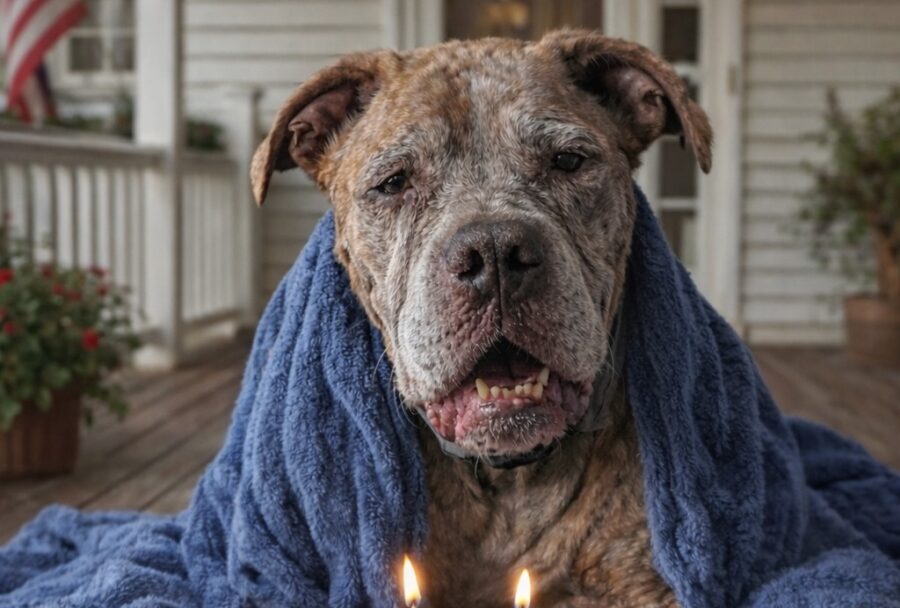

















:max_bytes(150000):strip_icc():focal(945x312:947x314)/princess-eugenie-princess-beatrice-prince-andrew-101725-8cc56d707e11429b954450f483ca8c84.jpg?w=1200&resize=1200,0&ssl=1)








